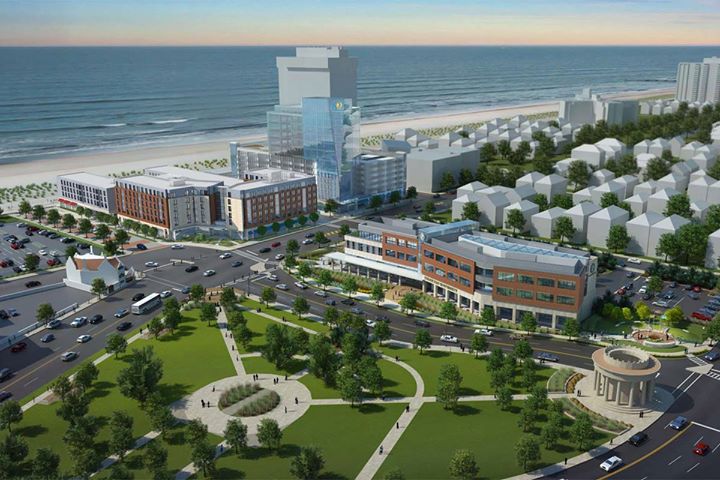Stockton University is seeking a coffee shop to occupy a boardwalk-fronting retail space in its planned $100-million-dollar student-residence building in Atlantic City, according to a document published on Friday.
The University’s request-for-qualifications (RFQ) is the most recent step in the realization of a total $200 million project that is set to bring massive change to the southern end of the city within a couple of years.
Prospective tenants must be regional or national brands, with at least five years’ business experience, according to the document (here). The coffee shop will be permitted to sell food that requires ‘limited cooking’ – since the University will be looking for a restaurant operator to move into a larger retail space in the same building.
The coffee shop is one of three total retail spaces in the residence building, which is set to become home to 533 students in August 2018. Stockton will soon search for a restaurant operator and the third retail space – on the corner of Roosevelt and Atlantic Avenues – will be a University bookstore-slash-convenience-store.
An academic building is being built across Atlantic Avenue from the residence building. A new parking garage is also under construction next door to the student residence. And a six-storey headquarters for South Jersey Industries is being built on top of the parking garage. The garage will include one retail space that is intended for medical use, according to the University’s RFQ. The so-called ‘Gateway’ project comprising all these buildings at the foot of Albany Avenue is being managed by ACDevCo, a not-for-profit corporation that is an offshoot of an entity that has developed similar projects for Rutgers University in New Brunswick.
For cash-strapped Atlantic City, it is worth noting that the coffee shop tenant will have to pay some real estate taxes. “In accordance with the PILOT (Payment In Lieu of Taxes) agreement with the City of Atlantic City, the Lessee’s portion of real estate taxes will be 2% of gross revenues received by the Lessee,” according to the request for qualifications on the website of Stockton Affiliated Services, which runs the University’s catering services. Atlantic City, mired in a financial crisis brought on by the shuttering of five casinos since 2014, has been treading a difficult line between trying to lure new development with incentives while simultaneously trying to increase its tax revenue. Although ordinarily non-profit entities such as schools and hospitals do not pay real estate taxes, the city last year reached a PILOT agreement with Stockton’s Atlantic City developer, ACDevCo, for a payment of $7.1 million through 2021 or about $1.4 million a year.
Stockton is also interested in building a marine sciences and resiliency center on a section of Bader Field, not far from the new Island Campus and also off Albany Avenue. That project could be developed in partnership with New Jersey’s Department of Environmental Protection and the city, The Press of Atlantic City reported.

